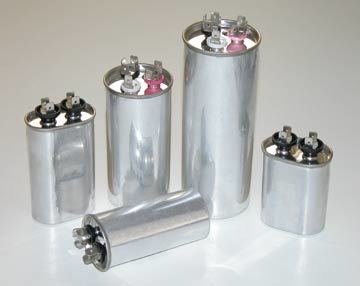What Are AC Capacitors and What Causes Them to Break?
The grueling heat of summer can take a toll on people, especially in hotter regions of the country. Thankfully, air conditioners allow us to find a place of refuge from the summer sun. Modern day air conditioners tend to be fairly reliable. They are made from just a few parts and should continue cooling you down for years and years with very little need for maintenance.
However, one day you may attempt to start up your air conditioner and find that it’s not working properly — it’s having a hard time turning on or it’s blowing out warm air. If that is the case, the capacitor may be to blame. Though the capacitor is just a small part of the air conditioner, it has a tremendous effect on its performance.
What is a Capacitor?
A capacitor is a small cylindrical device that looks like an oversized battery with two or three posts sticking out of the top of it. Composed of two metal conductors separated by insulating material, the capacitor’s main function is to give your air conditioner some start-up energy. When electricity runs through the capacitor, it swaps electrons between the two conductors, building up a charge.
Why is this necessary? Air conditioners require more energy to start up than your home’s wiring can provide. While your air conditioner draws power from your electrical grid, the capacitor gives it a jumpstart with extra energy. By working together, the capacitor and your electrical grid are able to provide your air conditioner with the energy it needs to get up and running.
Your air conditioner most likely doesn’t have only one capacitor — it may have several. These include the start capacitor, the outside fan motor run capacitor, the indoor fan motor run capacitor and the compressor motor run capacitor. This last one is the most common capacitor to fail in an air conditioner. It’s a dual capacitor with three terminals instead of two, and it has a big job to do.
Why Might a Capacitor Break or God Bad?
Capacitors are vital components in your air conditioner; they work hard and they are built to last. However, because they have such a tough job to do, they sometimes fail. There are a few factors that play a role in decreasing the lifespan of your capacitors. They are:
Age. Capacitors can’t work forever. The average lifespan of a capacitor is 20 years. You can expect a well-built capacitor to last that long. However, they can wear out quicker than that if things aren’t quite right. The lifespan of your capacitor can be reduced if it is undersized for your air conditioner or if it’s built from problematic parts. If that’s the case, don’t worry. The parts needed to fix this issue are relatively inexpensive, so it can be done on a budget.
Voltage Rating. Every capacitor comes with a voltage rating. Air conditioner technicians are able to look at this rating and know which capacitors can be used for which air conditioners. To cut costs, homeowners may try to replace the capacitor themselves without understanding how to choose the correct capacitor for their air conditioner. While an undersized capacitor won’t damage the unit, it will decrease the lifespan of the capacitor. If you decide to replace the capacitor yourself, stick to the idea that “bigger is better.” You can ensure that your air conditioner gets enough power by choosing a 400-volt capacitor for a 370-volt air conditioner unit.
Heat. Interestingly enough, though air conditioners are used to cool us down from the heat, hot air constantly beating down on the air conditioner is not good for your capacitor. Extended exposure to heat will shorten your capacitor’s life and potentially damage your air conditioner unit. To maximize your capacitor’s lifespan, make sure your air conditioner is shaded. Additionally, keep the unit clean and keep the air circulating.
If your air conditioner is blowing out warm air, or worse — it’s not starting, your capacitor may be failing. If that’s the case, or if your air conditioner isn’t quite running right, give an HVAC specialist a call. You can have your air conditioning problems diagnosed and fixed at a time that is most convenient for you.
